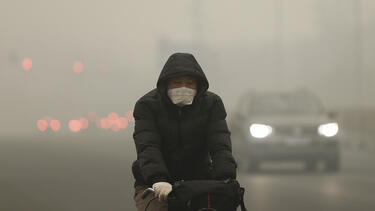All Insights Articles
Study: Rising Seas Aren’t Causing Coastal Property Values to Decline
Climate change is causing sea levels to rise, threatening expensive waterfront properties. But according to a new study co-authored by Yale SOM’s Matthew Spiegel, prices are not falling in the areas most likely to be affected.

To Extend Vaccines’ Reach, Distribute Them through Dollar Stores
A new Yale study says that a partnership with the Dollar General retail chain, which is being considered by the CDC, could bring vaccination sites substantially closer to low-income, Black, and Hispanic households in many parts of the United States.

Skilled Workers Flee from Polluted Cities, Hampering Economic Growth
In China, highly educated people are more likely to move away from areas with poor air quality. Reducing pollution could substantially increase GDP there and in other countries, according to a new study co-authored by Yale SOM’s Mushfiq Mobarak.

To Convince the Vaccine Hesitant, Understand Their Underlying Motivations
What will change the minds of those reluctant to get the COVID-19 vaccine? Yale SOM’s Vineet Kumar and two Yale doctors used the tools of consumer marketing to survey hesitant healthcare workers and analyze their responses.

How Better Mobile Crowdsourcing Can Help Combat Food Waste and Feed the Hungry
Yale SOM’s Vahideh Manshadi and Scott Rodilitz worked with Food Rescue US to hone their strategy for connecting volunteers with food donations. Their findings can help other nonprofits harness the power of crowds for social good.

How Connecticut Accelerated Its Vaccinations
Josh Geballe ’02, Connecticut’s chief operating officer, explains the state’s controversial decision to switch to age-based eligibility for COVID vaccines—and says it likely saved lives.

California’s Path to a Carbon-Neutral Grid
Elliot Mainzer ’98, CEO of CAISO, explains how California is working to avoid another summer of blackouts even as the state transitions to a carbon-neutral grid.

Georgia’s Voter Suppression Law Will Be the First of Many, If CEOs Don’t Speak Up
Yale SOM’s Jeffrey Sonnenfeld and longtime UPS executive Teri Plummer McClure write that business leaders failed to live up to their pledge to defend democracy when they largely stood silent as Georgia enacted restrictions on voting.

How COVID Has Worsened the Opioid Epidemic
There is another epidemic we cannot lose sight of: the opioid epidemic, which has become only more acute in the United States and elsewhere amidst the disruptions and stress caused by COVID-19.

Why the Texas Power Market Failed
Texas-based energy economist Ed Hirs ’81 says the February 2021 power crisis exposed longstanding, fatal flaws in the state’s energy market design and oversight.
